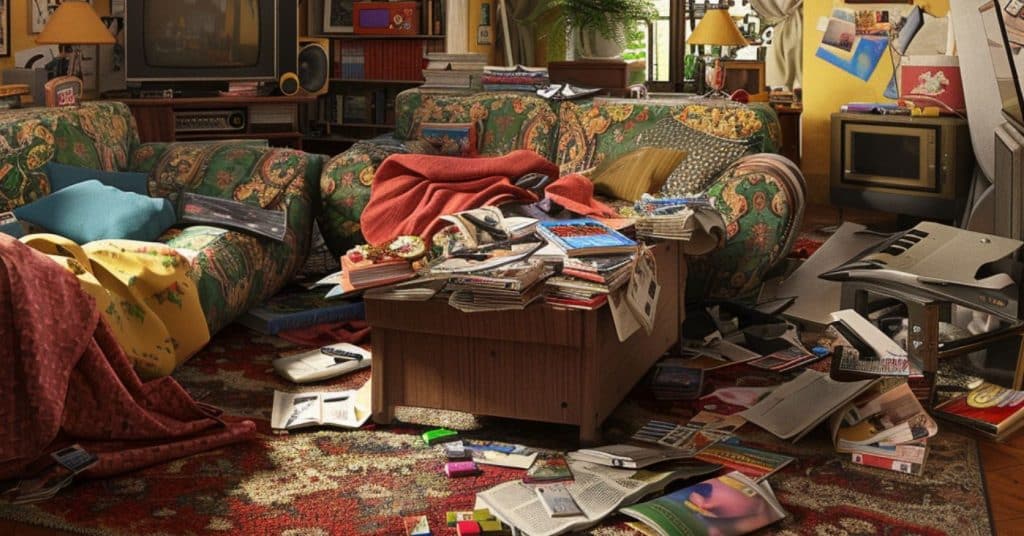We’ve all been there—skipping a deep clean because life gets in the way. But what happens when this becomes more than an occasional oversight?
The thought of dust bunnies taking over our homes is enough to make anyone shudder, yet the implications of never deep cleaning go far beyond just visual clutter. It’s about the unseen, the layers of grime and allergens that accumulate over time, affecting more than just the cleanliness of our living spaces.
In exploring the consequences of neglecting deep cleaning, we’re not just talking about a messy home. We’re delving into how this oversight can impact our health, our comfort, and even our mental well-being.
It’s a journey through the hidden dangers lurking in our neglected corners and under our beds, reminding us why taking the time to deep clean is more than a chore—it’s a necessity for a healthy, happy home life.
Understanding Deep Cleaning
The Significance of Deep Cleaning
Deep cleaning goes beyond surface-level tidiness, tackling hidden dirt, grime, and allergens that accumulate over time. It plays a crucial role in maintaining a healthy environment at home, preventing the buildup of substances that can affect our well-being.
By addressing areas that daily or weekly cleaning may well miss, deep cleaning ensures our living spaces don’t just look clean but are truly clean, contributing to improved air quality and reducing the risk of illness.
Comparing Regular and Deep Cleaning
There’s a big difference between deep cleaning and general cleaning.
Regular cleaning involves tasks we tackle frequently – dusting, vacuuming, and sweeping – focusing on the visible aspects of cleanliness.
Deep cleaning, conversely, dives into every nook and cranny, cleaning behind appliances, under furniture, and inside cabinets. It’s the difference between a quick tidy-up and a comprehensive overhaul of your living space.
While regular cleaning helps maintain a baseline level of neatness, deep cleaning removes the deep-seated dirt and grime, ensuring a healthier, happier home.
Consequences of Neglecting Deep Cleaning
Accumulation of Dust and Allergens
Ignoring deep cleaning invites dust and allergens to make themselves at home in our spaces. These unwanted guests settle in on surfaces, under beds, and in those hard-to-reach corners we forget about.
Say hello to sneezing, itchy eyes, and a host of allergic reactions if we let them stick around for too long. It’s like throwing a welcome party for nuisances that harm our health.
Mold Growth and Pest Infestations
Skipping on the scrubbing can turn our homes into a paradise for mold and pests. Humid areas, especially bathrooms and kitchens, become prime real estate for mold spores when not cleaned thoroughly.
Meanwhile, crumbs and spills are a VIP invitation for critters to move in. Before we know it, we’re sharing our living spaces with more than just family and friends, hosting unwanted micro-parties that can affect our health and home’s integrity.
Check our guide to learn how to remove mold from walls.
Long-Term Damage to Surfaces and Appliances
Let’s not forget the silent victims of our cleaning procrastination: surfaces and appliances. Dirt and grime don’t just sit pretty; they get cozy, causing surfaces to degrade and appliances to lose their efficiency over time. Imagine a fridge working overtime because its coils are caked in dust, or a once-shiny hardwood floor losing its luster.
We’re not just talking about a need for replacement sooner, but also throwing money down the drain with increased energy bills and repair costs. It’s like letting our hard-earned cash take a detour through our neglected chores.
Health Implications
Neglecting deep cleaning isn’t just about coming across a dirty sock under the couch a few months too late. It’s a direct ticket to a host of health problems that none of us want to RSVP to. Let’s break down what happens when dust bunnies become more than just uninvited guests.
Impact on Respiratory Health
Living in a house that skips the deep clean ritual is like hosting a party for dust mites, mold, and pet dander without realizing it. These unwelcome attendees don’t just sit quietly in the corner; they take a toll on our lungs and airways.
Asthma sufferers or those with allergies can confirm, as their symptoms often worsen in such environments. The constant inhalation of these particles can lead to chronic respiratory problems, frequent sneezing, coughing, and even more severe asthma attacks. So, if breathing easier sounds appealing, a deep clean may well just be the guest of honor your home needs.
Potential for Increased Illness
Let’s not forget about the invisible culprits—bacteria and viruses that love to take up residence in the nooks and crannies that regular cleaning skips. Kitchens and bathrooms are prime real estate for these germs, where they can multiply and spread, increasing the likelihood of infections and illnesses in the household.
Think of deep cleaning as the bouncer at the door, keeping unwanted germs out of the party. Skipping it is akin to sending out an open invitation for them to crash, bringing with them a cocktail of health issues that could’ve been avoided with a little elbow grease and a good scrub.
Psychological and Social Effects
Stress and Mental Well-being
Living in a home that hasn’t seen a deep clean in forever can really do a number on your mental health. You see, clutter and mess don’t just stay on our floors and shelves; they make their way into our minds.
Studies suggest that people inhabiting untidy spaces may feel more stressed, fatigued, and overwhelmed. It’s like trying to find peace in the middle of a storm; not exactly an easy feat. Without regular deep cleaning, our homes become sources of tension rather than sanctuaries from the outside world.
How a Dirty Home Can Affect Social Life
Let’s talk social life, or the lack thereof when your house is a no-go zone for visitors. Picture this: friends drop the “let’s catch up at your place” bomb, and you’ve got to invent an excuse faster than you can find a clean spot to sit.
An unclean home may unintentionally signal to friends and family that you’re not up for visits, isolating you from your social circle. In essence, skipping deep cleaning may well not just leave dirt behind; it could leave you missing out on good times with loved ones.
The Financial Cost
Higher Maintenance and Repair Bills
Neglecting deep cleaning doesn’t just leave a house looking less than appealing; it has real implications for a homeowner’s wallet. The accumulation of dust, grime, and unseen allergens can gradually damage home furnishings and building materials, leading to costly repairs and replacements.
For example, carpets and hardwood floors can endure irreversible damage from the grime that a simple vacuuming or mopping won’t fix. HVAC systems work harder in homes that aren’t regularly deep cleaned, as air filters clog up with dust and pet dander, shortening the system’s life span and increasing energy bills.
In essence, the money saved today by skipping deep cleans could translate into larger payouts down the road for maintenance and repair.
Decreased Home Value
A home’s presentation, its appeal during a showing, can either make or break a deal. Without regular deep cleaning, homeowners may find their property’s value dipping. This is because persistent issues like mold, mildew, and signs of pest infestations deter potential buyers. They see not just a house, but a project, a list of problems that they’ll need to address.
Real estate agents often emphasize the importance of a clean, well-maintained home in securing a good market value. If a home looks and feels neglected, its market value reflects that, making it difficult to achieve a top-selling price.
It’s a simple equation: a lack of deep cleaning leads to a decrease in home value, affecting the overall financial return when it’s time to sell.
If you’re a landlord, you need to clean your rental house so you can attract the best tenants and maximize your rental income.
How Often Should You Deep Clean?
Areas That Need Frequent Attention
Certain spots in the house beg for more regular deep cleaning than others. We’re talking about high-traffic zones and areas prone to bacteria and mold. The kitchen and bathroom top this list, needing a deep clean at least once a month. It’s in these spaces that germs joyfully congregate, thanks to the moisture and food residues.
Don’t forget about those sneaky spaces like under the sink, behind the toilet, and the refrigerator coils. Those areas may well not be visible at first glance, but they can harbor an impressive amount of grime and germs.
Creating a Deep Cleaning Schedule
Creating a schedule can transform the seemingly immense task of deep cleaning into manageable bits. Aim for a thorough house deep-clean every three to six months.
However, adjust this frequency based on your household’s specific needs—pets, allergies, and the number of residents can all dictate a more frequent schedule. Split the tasks over several weekends to avoid burnout; there’s no need to tackle the entire house in one go.
Allocate individual tasks each week, rotating through different areas. This approach not only makes the process less overwhelming but also assures that every nook and cranny receives the attention it deserves throughout the year.
By integrating these practices into our cleaning routine, we ensure a home that’s not just clean on the surface, but deeply sanitized and healthy. Remember, a clean home is a happier, healthier space for everyone who lives there.

